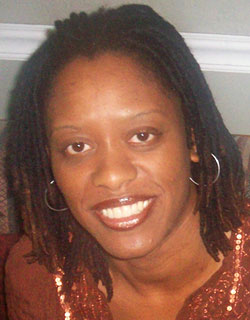About Melissa
| Treatment Type | Nocturnal Home Hemodialysis |
| Gender | Female |
| Age | 30s |
| Marital Status | Unmarried |
| Kids | Yes |
| Work Status | Working |
| Race | Black |
| Pets | No |
| Cause | IgA Nephropathy |
| Travel | No |
| Poor Vision | No |
Melissa was only 24 when she was told that she had kidney disease due to IgA nephropathy. Protein was clogging the "working" cells of her kidneys, and she was losing function. In most cases, IgA nephropathy gets worse slowly. Melissa and her doctor planned to manage it with diet and blood pressure pills. She was hopeful that she could put off kidney failure—and dialysis—for many years.
Turn for the worse
Melissa had a 6-year-old daughter and no problems with her first pregnancy. But, when she became pregnant again, her doctor was worried about the strain on her kidneys. And, he was right. Melissa spent most of her second pregnancy in and out of the hospital. Her creatinine kept going up. She gave birth to a healthy baby girl—8 weeks early—on July 16, 2001, but lost much of the kidney function she had left.
After a third pregnancy, Melissa's kidneys failed. Her son was born 15 weeks early, and Melissa was severely uremic. She was on her way to visit her new baby in the neonatal ICU when she passed out in the hospital elevator. "That's when they told me I needed to start dialysis right away," Melissa said. In 3 days, she had a catheter put in. Her first treatment was on June 6, 2002. "I felt a difference," she said. "And, I even tried to convince myself that just a few treatments would be enough."
Maintenance dialysis
Melissa soon learned, of course, that she would need dialysis treatments each week. She got a fistula and began a routine of Tuesday, Thursday, and Saturday hemodialysis (HD). As soon as she started, Melissa took an active role in her care. After just 6 months, she began to put in her own needles. "It just took one infiltration to convince me that I'd be better off placing the needles myself," she said.
For 2 years, Melissa kept up a grueling schedule of HD, full-time work as a Project Coordinator, and caring for her three children. Her son is legally blind, and came home from the hospital 5 months after Melissa started HD. He was on oxygen and needed daily nursing care. "It was stressful," Melissa admits. She got through that difficult time with support from family and friends.
Home option

The nurses who took care of Melissa at DCI in Kansas City said she might want to think about trying home HD. Melissa saw right away that home HD would help with her busy schedule. "I wouldn't have to rely on family to watch my kids so much if I could do my treatments at home," she said. So, she applied to the home program and was accepted. "They like home patients to have a partner," she said, "but they took me without one because they had confidence in me."
Melissa trained for 6 weeks. "My employer has been very understanding of my health needs," she noted. "They worked with me so I could do home HD training." With her employer's okay, Melissa changed her schedule. She worked from 7:30 am to 2:30 pm each day, then went for training from 3:00 pm to 8:30 pm. "It was hard," she admits, "but I wanted to get the training out of the way so I could go home." When she did go home, "The first thing I recall thinking was 'I can eat a real Thanksgiving dinner!'" Melissa laughs.
Absolutely wonderful
Melissa says that the flexibility she has gained with home HD is, "Absolutely wonderful. Now, I can work full time and fit my treatments into my life." She is also able to eat a much more liberal diet. "My biggest challenge with in-center HD was the diet," she admits. "I love food, and I had to cut back on so many things. Now, I can eat what I want. I still watch potatoes, tomatoes and oranges. But, now I can have iced tea and even Pepsi, since I take it off."
Melissa has her Fresenius H machine set up in her bedroom, right next to her bed. She dialyzes every other night for 8 hours. "I know most home HD patients run 6 days a week, but that doesn't work for me," she claimed. "I'm the exception to every rule, and if I dialyze too much, it throws off my lab results."
Her two older kids help Melissa with equipment set-up and monitoring. "They are so familiar with all this medical stuff," Melissa joked, "that I call them my nursing staff."
Worth the effort
Even though home HD is a lot of work, Melissa has no doubt that it's worth the effort. "You need a lot of dedication and self-discipline," Melissa says, "but it has great benefits."
Melissa credits her care team at DCI, Dr. Walter Bender and nurse Sandra Copeland, with giving her the chance and the skills to make home HD a success. "They believed I could do it, and they helped me reach my goal."

